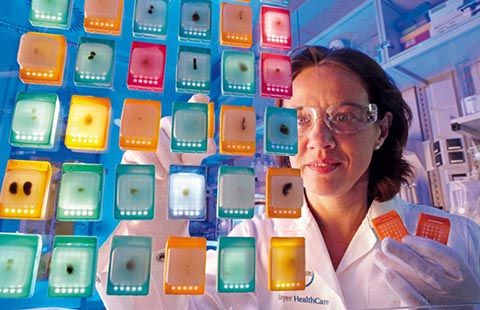Study links pesticides to poor sperm
Updated: 2015-04-01 07:49
By Agence France-Presse in Paris(China Daily)
|
||||||||
Higher levels of pesticide residue in fruit and vegetables are associated with lower quality of semen, according to a study published on Tuesday.
Its authors said the research was an early step in what should be a much wider investigation.
As an initial recommendation, they urged men not to stop eating fruits and vegetables but suggested organically grown food, or food that is low in pesticides, as options for lowering risk.
The US team analyzed 338 semen samples from 155 men attending a fertility center between 2007 and 2012.
The volunteers were 18 to 55 years old, had not had a vasectomy, and were part of a couple planning to use their own eggs and sperm in fertility treatment.
The men were asked to fill out a questionnaire about their diet, asking them how often, on average, they consumed portions of fruit and vegetables.
These portions were then placed into categories of being low, moderate or high in pesticide residues, on the basis of US Department of Agriculture data.
Peas, beans, grapefruit and onions, for instance, fell into the low category, whereas peppers, spinach, strawberries, apples and pears were in the high category.
The data considered whether the items had been peeled and washed before being eaten.
Men consuming the most high-residue fruits and vegetables had a total sperm count of 86 million sperm per ejaculate - about half that of men who ate the produce with the least residue. They had a sperm count of 171 million per ejaculate.
In addition, men with the lowest pesticide residue intake had an average of 7.5 percent of normally-formed sperm. This tally was significantly lower - 5.1 percent - among those who had the highest intake. There were no significant differences between the low-and moderate-residue groups.
"To our knowledge, this is the first report on the consumption of fruit and vegetables with high levels of pesticide residue in relation to semen quality," found the study published in the journal Human Reproduction.
"These findings suggest that exposure to pesticides used in agricultural production through diet may be sufficient to affect spermatogenesis in humans," it said.
The study acknowledged limitations.
For example, men attending fertility clinics are prone to having semen quality problems, and the diet in this case was assessed only once and could have changed over time.
In addition, pesticide residues were estimated rather than actually measured in the lab, and it was not known whether the fruits and vegetables that were consumed were conventionally grown or organic.
(China Daily 04/01/2015 page12)

 6 cultural differences between China and the US
6 cultural differences between China and the US
 Mother illustrates her pregnancy
Mother illustrates her pregnancy
 In memory of movie star Leslie Cheung
In memory of movie star Leslie Cheung
 Top 10 best employers in China in 2015
Top 10 best employers in China in 2015
 World's largest reclining Buddha statue in Jiangxi
World's largest reclining Buddha statue in Jiangxi
 First round-world solar flight stops in China
First round-world solar flight stops in China
 Elderly care explored for investors, needy
Elderly care explored for investors, needy
 Sasha Obama took trip to China
Sasha Obama took trip to China
Most Viewed
Editor's Picks

|

|

|

|

|

|
Today's Top News
PMI indicates factories back to expansion
Chinese woman charged with fraud remains in US jail
Forty-six countries seek to join AIIB
Tales of a nomad
US 'willing to work with AIIB': Lew
Silk Road connects China to the world: BOC chairman
Washington 'willing to work with AIIB'
China should police bad foreigners, too: expert
US Weekly

|

|






